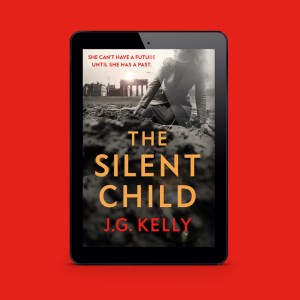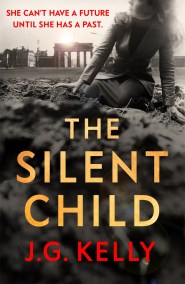Read a free extract from The Silent Child by J G Kelly
Read the opening of The Silent Child by J G Kelly

The Silent Child is coming Thursday 7th April!
PROLOGUE
Long Fen, Cambridgeshire, December 1945
Hanna sat alone on the back seat of the polished black car, her battered suitcase on her lap, the world outside only dimly seen through the misted windows. The engine, cooling, made an odd ticking sound, but otherwise there was silence, until she heard crows calling. She cleared a porthole in the condensation with her glove. The landscape was entirely flat, but upside down: the sky grey and sooty, while the snow-covered fields seemed to pulse with a gentle current of inner light. Her breath kept obscuring the scene, so that she had repeatedly to wipe the glass clear, each time noting another visual detail: a lone willow, a string of telegraph poles running to the horizon, a stretch of water-filled ditch, the surface glazed with ice as if by cataracts.
Setting the case carefully down she slid across the leather seat and cleared a circle in the window on the opposite side of the car. Mr Hasard, the driver, was smoking by a mail- box mounted on a metal post. When they’d come to a halt after the journey north from London, he’d wound down his window and sounded the horn, and Hanna had counted out the triple echo. He’d done it again before switching off the engine and getting out, his shoes making a brittle crunch in the snow.
‘They’ll be here soon,’ he’d said, although who ‘they’ were had not been clear. Hanna was inured to these moments, when the adult world seemed to require only that she sat qui- etly and waited politely for the future to unfold.
She watched Mr Hasard throw the cigarette away with an impatient gesture, stamping his feet, looking towards a house in the distance that stood half a mile away, at the end of a rutted track.
Hanna read the sign that hung from an iron arm on the mailbox:
SWAN HOUSE MAZUREK
Mr Hasard came back to the car, threw open the door, and pressed down on the horn, the cigarette hanging from his mouth.
‘We’ll have you warm and safe soon,’ he said, checking his watch.
When he’d come to the chateau in Poland to fetch her – the car was black again, but smaller, battered and dusty – he’d taken her hand and said he was ‘Mr Hasard-with-one-S’, and that he was her provisional guardian. His duty was to collect Hanna and take her to Paris where ‘further decisions’ would be made about her future.
They had driven for three days, skirting towns where it was possible, but where they couldn’t, edging through streets full of rubble, past sullen crowds gathered around bonfires against the cold. The fires carried ash up into the sky, and Hanna watched the rising smoke, craning her neck to see the clouds, while everyone else seemed hypnotised by the flames.
When Hanna wasn’t asleep on the back seat she sat next to Mr Hasard, who asked her gentle questions she couldn’t answer. There was something wrong with Hanna’s memory. The last year, which she’d spent in the caretaker’s cottage on the estate, was vivid: from the swans on the frozen lake at Christmas to the rabbits running from the last stook of hay at harvest time. But back beyond these images there was nothing. The first six years of her life were lost, and when she was urged to see into that darkness she had to look away, although she never cried.
They reached Paris, a pale city, where all the buildings had been arranged in squares, and around parks, or along wood- ed streets, and all the fountains were dry, and full of snow. The apartment was on rue Delambre and had so many mirrors, and tall windows, Hanna felt constantly unsure if she was looking at the real world of rooftops and drifting smoke, or its reflection. The rooms were bare, but the plaster was ornate, and depicted swans, just like the ceilings at the chateau. Mr Hasard came each day and explained that he was waiting for what he always called ‘instructions’. A tutor visited in the afternoons to teach Hanna English and French, but she still thought in German, although some of the few words she said out loud, and unbidden, were Yiddish – words she was urged to forget.
A woman called Suzanne looked after her and cooked her meals, and was always there, beside her bed, when she woke up pooled in sweat, rigid with nightmares she couldn’t re- member. In the dusty park by the apartment, Suzanne told her that the doctor, who had examined her twice in the yellow day room, thought she’d had a great shock, which had upset her so much that the past was lost, but that it might be found, if they were patient and kind. Hanna asked for a sketch-book and pencils, and Mr Hasard admired her work, although it revealed nothing of the past.
Finally, after three months, instructions did arrive in Paris, and now here she was, after a journey of trains and boats, somewhere north of a city called Cambridge, in England, on what Mr Hasard called a ‘fen’ – a frozen landscape of fields and poplars, which reminded her of Poland, as if her journey had described a great but pointless circle.
She heard brittle footsteps on ice, and then voices close to the car, and through the porthole that she’d cleared she saw that two elderly people had arrived and were shaking hands with Mr Hasard.The three adults, dimly seen as a single shad- ow, came to the side of the car. The door opened, and Hanna had to jump down, clutching her case.
Mr Hasard performed a slight bow towards an old man. ‘Hanna, this is Count Mazurek.’
‘Welcome to Swan House, Hanna,’ said the old man, in what Hanna recognised as English, which he spoke very slowly.
‘You can call me Uncle Marcin. This is my wife.’ It wasn’t an old man’s voice, Hanna thought, and she saw that his hair
– which was swept back off a broad face, was only streaked with grey. He had a peasant’s great hands – like those of the estate workers back in Poland – and broad shoulders, and a round head that hung forward, as if its weight was too much.
He took her hand gently in what Hanna felt was a sign of welcome.
But his wife, who was bird-like and still, stood back watch- ing them both.
‘She remembers nothing?’ said the count to Mr Hasard. ‘No. As I said in my letter, she can recall nothing before
the estate at Łabędzie,’ he said, slipping on a pair of driving gloves. He opened the boot of the car, retrieved a large flat brown paper parcel, and gave it to the woman, who clutched it to her chest.
‘But she can speak?’ asked the count, looking at Hanna, and then Mr Hasard, a smile widening.
‘Oh yes. When spoken to.’
They all looked at Hanna, who looked at them back.
Mr Hasard touched the rim of his hat. ‘I must get the ferry, and the roads are bad. The car has to be back by nightfall.’
A minute later, after a conversation Hanna did not under- stand involving ‘expenses’ and an ‘invoice’, Mr Hasard shook her hand and then they all stood back and watched the shiny black car drive away, until it seemed to tip over the distant horizon.
Marcin took Hanna’s suitcase, and they set out on the rough, icy track to the house. He told Hanna that they too had once lived in the great chateau at Łabędzie and that his wife was a countess, but Hanna could call her Aunt Lydia. They had fled Poland when the Germans invaded in the first days of the war so that the count could continue the battle in the sky. Their grown-up daughter Natasza had been left behind, trapped in a city called Warsaw, where she had bravely helped hide Jewish children like Hanna away from the Nazis who wanted to kill them. Finally, she’d escaped with Hanna to the family estate, and hidden her safely away again. But Natasza had been killed helping others reach freedom.
All this, the most important words Hanna had ever heard, came from the mouths of these two strangers out on this wide fen, under a tin-lid sky, on a still-born day, already close to dusk. Hanna felt she should mark the moment, so she stopped walking and turned to face the countess. ‘I’m sorry I don’t remember,’ she said.
‘In time,’ said Aunt Lydia, smiling with her lips, but not her eyes, which never seemed to meet Hanna’s.
The house had a brick façade – flat and foursquare, with blank windows – and a central door with two pillars that held up a little roof, which tilted giddily to the left. It looked like the house was falling over very slowly. Smoke dribbled from a chimney in a black lazy line.
The front door swung open to reveal a bare hallway, with worn wallpaper, and floorboards. The house smelt of cabbage and polish. In a kitchen with a stone floor Aunt Lydia gave her a glass of milk and boiled her an egg, which Hanna ate with bread and butter in front of a coal fire. Lydia also gave her a cup of black tea that tasted of herbs, which Hanna sipped, staring into the flames. She felt that if she kept very still, and silent, and remained well-behaved, things she wanted to hap- pen would keep happening; she’d be left alone in a room of her own, and then she could open her suitcase and take out her sketch-book and pencils.
Lydia announced that Hanna was tired and should go to bed.
‘It’s gone bedtime for little girls,’ she said, but Hanna felt this remark wasn’t for her at all, but someone in the past.
They climbed up uneven wooden steps to the second floor, and then to an attic, which comprised several rooms off a wide corridor. Lydia showed her into one, at the front of the house, with a sloping ceiling and a single window. Marcin pulled back a heavy curtain to show Hanna that snowflakes were touching the glass.
The bed was big enough for two grown-ups and was made of iron, and Lydia had to help Hanna turn back a wedge of blankets so that she could slip beneath. Her suitcase was set on a wooden chest while Marcin fetched a glass and a jug of water. Finally, the old man stood at the door, his hand on the light switch, smiling shyly before letting the darkness flood out from the corners of the room to press against Hanna’s eyes.
She heard them say goodnight.
Sleepless an hour later, she burrowed her way from under- neath the covers, drew back the curtains, and looked out over the strange flat country, disguised by snow, but now under the light of a familiar moon, by which she opened her sketch- book and drew the first line, describing the pale horizon.
The Silent Child
by J.G. Kelly
SHE CAN'T HAVE A FUTURE UNTIL SHE KNOWS WHAT HAPPENED TO HER FAMILY AFTER THE WAR.
'Deeply moving and beautifully written' ANN CLEEVES
'Heart-breaking, beautiful and thrilling - a book that will stay with you for a very long time' ELLY GRIFFITHS
'A tale of devastating secrets, brilliantly told' RORY CLEMENTS
1944
LEO STERN arrives at the Nazi camp at Borek with his wife Irena and his two daughters. The Sterns are spared from the gas chamber when they witness a murder. But in a place that humanity has deserted, Leo is forced to make unimaginable choices to try to keep his family alive.
1961
For seventeen years, Hanna has been unable to remember her identity and how she was separated from her family at the end of the war, until the discovery of a letter among her late uncle's possessions reveals her real name - HANNA STERN - and leads her to Berlin in search of her lost past.
Helped by former lover Peter, Hanna begins to piece together the shocking final days of Borek. But Hanna isn't the only one with an interest in the camp, and lurking in the shadows is someone who would prefer Hanna's history to remain silent.
Based on in-depth research and beautifully written, this a novel of memory and identity, and the long shadow of war.
'Outstanding. Heartstopping. Brilliant. A story that scorches the page, searing in its honesty and profoundly moving in its emotional impact. This is an important, powerful novel that everyone should read' KATE FURNIVALL
'Taking the reader from the atmospheric Fenlands of Cambridgeshire to the ghost-filled forests of wartime Poland and finally into Cold War-era Berlin, The Silent Child is a thought-provoking and compelling novel about the long-lasting aftershocks of war. This is great storytelling, full of mysteries and twists, epic in its sweep, but precise and respectful in its historical details. J. G. Kelly's vividly evoked scenes will stay with me for a long time' CAROLINE SCOTT
'This book was such a beautifully written book that will stay with me for a long time. The storyline was emotive and heart wrenching and the characters were well developed and have a special place in my heart. I didn't want this book to end. Nothing I could say would do this book justice, I cannot recommend this book enough' Reader review
'It's beautifully written with a story that draws you in so quickly, it's very well researched and heartbreakingly realistic. A book I wanted and needed to finish. The sort of book everyone should read. The most compelling book I've read this year' Reader review
'Utterly impossible for me to put down. A heartbreaking story... I found I had devoured the entire book in just one sitting... I have loved this book so much, I wish I could give it five hundred stars. All I can say is "WOW - read it. You won't be disappointed' Reader review
'I was engrossed in the story. The author has done tremendous research about the war and did a good job of drawing the reader into the story' Reader review






